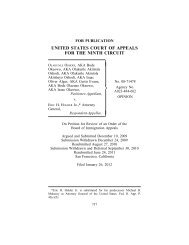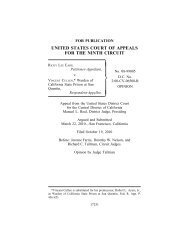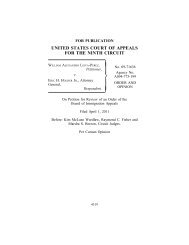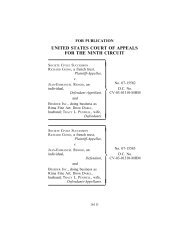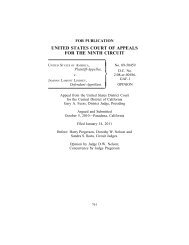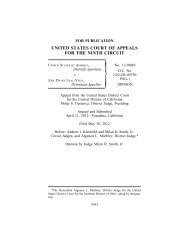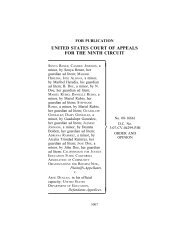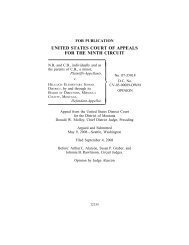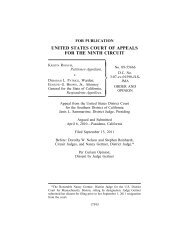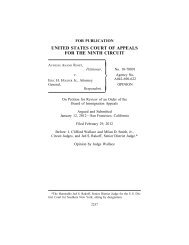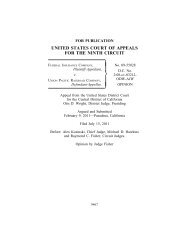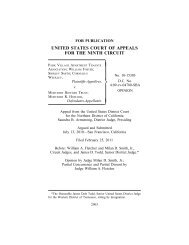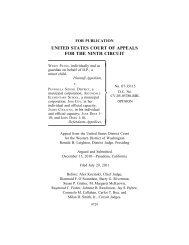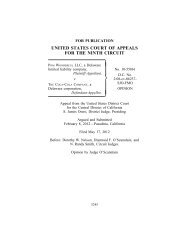USA v. Xavier Alvarez - Ninth Circuit Court of Appeals
USA v. Xavier Alvarez - Ninth Circuit Court of Appeals
USA v. Xavier Alvarez - Ninth Circuit Court of Appeals
You also want an ePaper? Increase the reach of your titles
YUMPU automatically turns print PDFs into web optimized ePapers that Google loves.
a private person’s economic interests. See, e.g., United States<br />
v. Dunnigan, 507 U.S. 87, 94 (1993) (“A witness testifying<br />
under oath or affirmation violates [the perjury statute, 18<br />
U.S.C. § 1621] if she gives false testimony concerning a<br />
material matter with the willful intent to provide false testimony,<br />
rather than as a result <strong>of</strong> confusion, mistake, or faulty<br />
memory.” (emphases added)); 18 U.S.C. § 1035 (prohibiting<br />
knowing and willful, material false statements made to obtain<br />
health care benefits). Into this area <strong>of</strong> the law we would also<br />
place Clipper Exxpress v. Rocky Mountain Motor Tariff<br />
Bureau, Inc., 690 F.2d 1240, 1262 (9th Cir. 1982) (holding<br />
that the First Amendment does not protect deliberately misrepresenting<br />
facts to an administrative body for anticompetitive<br />
purposes ”). 12 Thus, falsity alone is not enough. The<br />
context must be well-defined.<br />
In addition, impersonation statutes are drafted to apply narrowly<br />
to conduct performed in order to obtain, at a cost to<br />
another, a benefit to which one is not entitled. See 18 U.S.C.<br />
§ 912 (“Whoever falsely assumes or pretends to be an <strong>of</strong>ficer<br />
12 Clipper Exxpress supports the cautionary holding we reach today. In<br />
that case, we explained:<br />
UNITED STATES v. ALVAREZ<br />
The first amendment has not been interpreted to preclude liability<br />
for false statements. For example, defamatory statements can be<br />
made the basis for liability. 18 U.S.C. § 1001 imposes criminal<br />
penalties for knowingly and wilfully concealing or misrepresenting<br />
material facts before any department or agency <strong>of</strong> the United<br />
States. <strong>Court</strong>s uniformly punish perjury. As the Supreme <strong>Court</strong><br />
stated in [Gertz, 418 U.S. at 340], “there is no constitutional<br />
value in false statements <strong>of</strong> fact.” Contrary to defendants’ assertions,<br />
there is simply no basis to hold that deliberately misrepresenting<br />
facts to an administrative body for anticompetitive<br />
purposes enjoys blanket first amendment protection.<br />
11871<br />
690 F.2d at 1261-62. We read Clipper Exxpress to explain, as we have<br />
done herein, that although false factual speech is not protected for its own<br />
sake such that the First Amendment precludes its prosecution, laws prohibiting<br />
it must nonetheless target well-defined subsets <strong>of</strong> speech like defamation<br />
or fraud or other clearly-defined criminal conduct.



